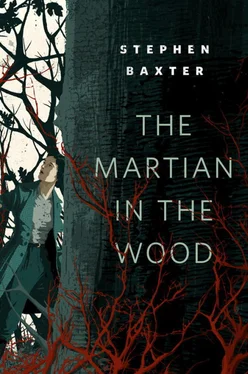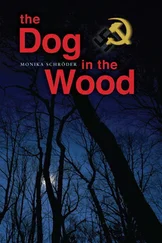She stared at him. “You can’t be serious. You’ve only just come back – look at the state of you, half starved, bloodied. You look ill, actually. Doesn’t he, Pierce?”
But Pierce, standing discreetly at his station by the door, would not reply.
“You wouldn’t understand, Zee-zee,” Nathan said.
She was growing concerned, and not a little angry. But she said, “What of Mum and Dad?”
“Ah.”
“Look, there are papers to go through. Decisions to be made, once we get probate. I don’t think it’s right that I alone …”
His expression changed, from that distracted self-absorption. It was as if he saw her properly for the first time since coming home. He reached across the table and touched her hand. “I’m sorry, Zee-zee. I’m being selfish.”
She shook her head. “They left wills. But they weren’t planning to die. And without the bodies –”
“Of course. I’ll stay.”
“How long? And then? Will you go back?”
He shrugged. He didn’t need to reply.
* * *
In the end he stayed two nights, before dressing in his country clothes, and packing a bag with food, water, some basic medical supplies (at Zena’s insistence), and a Kodak (at her suggestion), and walking off, across the fields of the estate with their pale wheat and their grazing sheep, back to the Wood.
He was gone many days.
And before his next, brief return, Zena would tell Walter, the strangeness began.
An extraordinary summer gave way, in that corner of Sussex at least, to a remarkable autumn. Or, uncanny – that was the word Zena would use later, when she tried to describe all this to Walter.
Zena tried to keep herself occupied with the business of recovery, as she thought of it. Helping Pierce with mundane chores in the house and garden. The business of the Holmburgh estate had to continue, of course; too many tenants’ livelihoods depended on it. And she continued the process of untangling her parents’ affairs, and she had to make visits to London for gruesome inspections of fragments found in the slowly cleared rubble: a wedding ring, an inscribed pocket watch. There was a page from a letter that appeared to be from her father to a mistress Zena had known nothing about. She crumpled this up and destroyed it, distressed, shocked, resentful at having to confront this aspect of her parents’ own complicated lives, now cruelly cut short.
She felt isolated. She missed her life in London and Paris before the War, although that was all disrupted now anyhow. Her own future was suspended; she had for now to assume the burden of the family. But that was what survivors of disasters always had to do, she supposed. She tried to suppress the resentment she felt, at Nathan for his absences – even at her parents for being dead, an illogical feeling and unworthy.
And meanwhile, as I have said, the world, or this corner of it at least, seemed… strange.
For one thing there was the weather, which, even from late August, was unusually still and dark and cold , with barely a gleam of sunlight breaking through a stubborn bank of low cloud, for day after day. There was no wind to speak of either. It was as if, she mused, a permanent high pressure system had installed itself over Holmburgh – and it was only here; if you went ten miles in any direction you encountered a much more reasonable mix of seasonal weather, sun and showers, wind and still.
The air seemed to grow stagnant. When the stubble was burned, the smoke lingered for days, catching her throat.
The farmers too were unhappy, it seemed to her as she took her daily constitutional walks to different parts of the estate. Unhappy and faintly confused. The harvest was poor, the grain swollen on the stalks but dry and powdery when it was reaped. The cows were giving thin and sour milk; the sheep, soon to be tupped, were fractious and prone to panicky bolting.
The swallows and swifts and martins left weeks earlier than usual. Only the crows prospered, great clouds of them gathering unnaturally early over the shadowed Wood.
Zena saw her brother only in glimpses, during visits back to the house that became ever shorter, ever more infrequent. He would fill himself with food, grab a fresh set of clothes, sleep a night or two – he would put up with his sister’s administering to his cuts and bruises, he even let her cut his increasingly ragged hair – and then he would disappear again.
She clung to the memory that they had in fact been quite close as children, given they were only a year apart – in 1907 she was twenty-six, he twenty-five. They had always been somewhat isolated on the estate, and had never mixed with the children of the farmers. Now Zena tried not to be jealous, as she struggled with the still desolating aftermath of her parents’ deaths, while he was free to roam in his Wood as he pleased.
Except that, she increasingly felt, he wasn’t free at all.
* * *
At the beginning of October, there was a rash of allegations by the tenant farmers of “sheep rustling”.
Only a few animals had been lost, but with such relatively small flocks each animal represented a high proportion of a farmer’s annual income, and they counted every penny.
All the animals disappeared entirely, save one – and this was a carcass recovered from where it had been hung up at the edge of the Wood. The farmer, as baffled as he was angry, showed Zena how the animal had been bound and suspended by her back legs, and then the blood had run out of the slit throat, presumably into some container – you could see the dried smears on her jaw and upper fleece.
No blame was attached. Nathan’s name was not spoken. But his antics in the Wood were as well known to the farmers as they were to his sister.
Wordless, Zena paid over the value of the lost animals to each tenant. She wondered in fact if the farmers’ angry silence hid some grain of sympathy for her.
The tenants took to patrolling their fields. After a few gunshots, aimed, it seemed, at elusive shadows, the wave of rustling stopped.
It was at this point that, casting around for help, she first thought of writing to Walter. It was the connection with the War, you see: the coincidence of that first fiery phenomenon in the Wood with the ending of the War, and then Nathan’s reported glimpse of a ‘towering skeleton’, what sounded – at least to her, who had seen no Martian close to – like Martian technology, those fighting-machines tall as steeples. And Walter Jenkins was in the news: badly scarred himself from his flight through the Martian killing fields, grave, authoritative, a name she had been aware of before the War, and now reincarnated as a source of commentary and wisdom on all things Martian.
(You might imagine she could have approached the local police, or town council, before a figure like Walter. All I can say is that given my own experience of country bobbies, if she had come forward with such an ambiguous account as she had at that point, her reward would have been a patronising brush-off and a diagnosis as a hysterical woman.)
Walter, however, at the time, though he was responsive by letter, could do little to help. He offered cold comfort with a speculation that there was much about the Martians that mankind had yet to unravel. And he urged her to contact him again, by letter or telegraph, if the need arose.
Some days after that, with Nathan still absent, Zena steeled herself to go see the Wood for herself.
* * *
She donned stout outdoor clothes, sturdy boots, loaded her father’s shotgun, and set off along the trail to the Wood.
She walked as close as she could bear to that dark tangle. Near the perimeter of the Wood the ground was oddly poor, the grass giving way to stubborn moss or lichen, even bare soil in places, dirt that looked leeched of its goodness. The Wood itself, at its very edge, looked normal, with saplings pushing through the leaf debris. She recognised rowan, elder, hawthorn, among the oak. But within this outer band the trees, mostly oak, grew thick and old and tangled and dark.
Читать дальше










